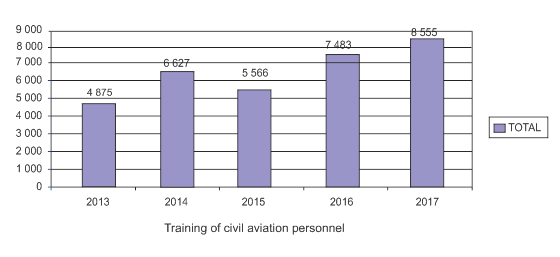Civil Aviation Training
A total of 796 fellowships were awarded under technical cooperation projects, for a combined duration of 871 work-months, of which 603 (75.8%) were awarded to male participants and 193 (24.2%) to female participants, as described below:
| • | 319 fellowships were awarded to 260 male and 59 female participants under country and regional technical cooperation projects funded by recipient governments or donors; |
| • | 116 fellowships were awarded to 66 male and 50 female participants by Aena S.A. (ENAIRE) of Spain for training in the areas of accessibility and assistance to people with reduced mobility at airports, corporate social responsibility, integrated management systems, safety management, airport planning, aeronautical regulation, and airport management and financials; |
| • | 361 fellowships were awarded to 277 male and 84 female participants under Memoranda of Understanding signed by ICAO with India, the Republic of Korea, and Singapore for the provision of training to be funded by these countries and administered by ICAO. Of these: |
| | - | 13 fellowships were awarded to nine male and four female participants for training undertaken at the Indian Aviation Academy in airport cargo operations management and airport non-aeronautical revenue courses; |
| | - | 217 fellowships were awarded to 169 male and 48 female participants for training undertaken at the Civil Aviation Training Centre of Korea Airports Corporation (KCATC) and the Incheon Airport Aviation Academy (IAAA). Related subject matters included airport pavement evaluation, aviation security and safety, airport construction and operation, radar approach control, aviation policy for executives, Doppler very high frequency omnidirectional radio range/distance measuring equipment (DVOR/DME) maintenance, airport customer service quality management, safety oversight management and practical preparation for ICAO Universal Safety Oversight Audit Programme (USOAP)-Continuous Monitoring Approach (CMA), airport lighting operation and management, instrument landing systems (ILS) maintenance, and aerodrome communications, navigation and surveillance (CNS) engineering; and |
| | - | 131 fellowships were awarded to 99 male and 32 female participants for training undertaken at the Singapore Aviation Academy (SAA). Related subject matters included emergency management, safety oversight inspection (air navigation services, flight operations), methodology and best practices for aviation system block upgrades (ASBU) implementation, aviation security management programme, safety oversight inspection (aerodromes), safety audits of air traffic services, aerodrome certification, airport terminal operations and management, airport security operations management, State Safety Programme (SSP) implementation, air traffic management safety investigation and analysis, civil aviation management programme, air disasters crisis planning and business continuity management, and safety oversight inspection (flight operations). |
ICAO experts recruited through technical cooperation and technical assistance projects provided in-country training in various fields for a total of 7 166 civil aviation administration personnel. Out of the 7 055 personnel trained within technical cooperation projects, 4 553 (64.5 per cent) were male and 2 502 (35.5 per cent) were female, while 100 per cent of the 111 personnel who received training within technical assistance projects were male.
Recipient States also continued to include substantial training for their nationals as part of the procurement component of their ICAO technical cooperation projects. In addition, 593 national staff benefited from training in new technologies and in the operation of equipment purchased through ICAO technical cooperation projects.
The training of management, technical and operational personnel was particularly important in terms of improving State oversight capabilities. According to information provided by Member States, personnel trained through the Technical Cooperation Programme are progressively absorbed by civil aviation administrations, which greatly benefit from the training and retention of a workforce of qualified aviation safety and security personnel, including inspectors.

